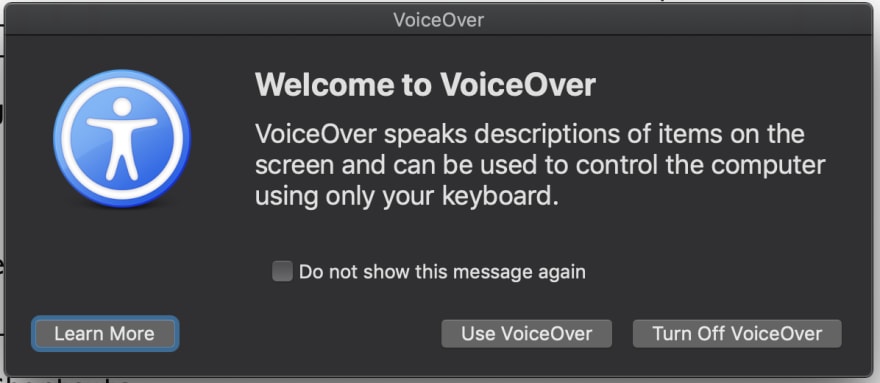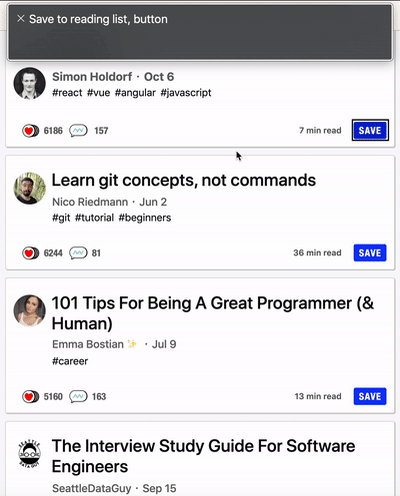What is VoiceOver?
VoiceOver is a free screen reader built into Apple products (MacOS, iOS, etc). Screen readers are used by visually impaired users to navigate through content on their device(s).
As a web developer, it is vital that testing with a screen reader is part of the development workflow – much like running a linter, writing tests, or adjusting mobile responsiveness. Screen readers are a surprisingly large part of the web's user-base. It is estimated that between 1-2% of internet users in the United States use screen readers (~4 million) 😲.
A great first step in finding accessibility issues in a website is by becoming familiar with and using a screen reader on a consistent basis. Since VoiceOver comes pre-installed on MacOS, there is no need to download or configure a third party application!
Starting VoiceOver
For the purposes of this article, we'll focus on using VoiceOver with MacOS. VoiceOver works best with Safari, but also works well with both Chrome and Firefox. Luckily, starting VoiceOver is super simple:
Turn VoiceOver on/off → ⌘ + F5
After selecting "Use VoiceOver" the computer will start speaking the highlighted item on your focused application (black outline) while also providing a dialog box with the current transcript. At this point, the selected item on the screen can be changed by navigating with mouse. Feel free to click around to get a feel for the announcement of different types of elements.
VoiceOver Keys
The VoiceOver command keys (VO) are required to interact with VoiceOver shortcuts:
⌃ + ⌥ (Control + Option)
or
⇪ (Caps Lock)
The following shortcuts will utilize the VoiceOver command keys to interact with VoiceOver.
Navigation
Read next item → VO + Right Arrow
Read previous item → VO + Left Arrow
With these two commands, it is possible to navigate through the entire website as a VoiceOver user would. Screen readers not only focus on buttons and links, but also elements with text content.
After using VoiceOver navigation, it may quickly be apparent that some items on the website are not announced in a meaningful way. This is a great opportunity to read up on WAI-ARIA and WCAG 2.1. As web developers, we want our web applications to be usable by as many people as possible – fixing accessibility issues is often quick and extremely helpful to our screen reader users.
Useful Shortcuts
The following shortcuts are not mandatory for using VoiceOver, but can be useful for quickly navigating through an application (rather than pressing the right arrow 1 million times 😉).
Lock into Command Mode
Optionally, it is possible to lock into VoiceOver command mode, with the following shortcut:
Lock into command mode → VO + ;
After locking into command mode, it is not necessary to use the VoiceOver command keys, but this will restrict the ability to type normally as many keys are tied to VoiceOver shortcuts.
VoiceOver Rotor
The Rotor allows the user to quickly navigate to different sections of the website and provides a useful widget to visualize the content of the web page. Navigation within the rotor can be accomplished with the arrow keys.
Start the Rotor →VO + U
Navigation Shortcuts
Although this can also be accomplished with the rotor, sometimes it is useful to navigate to headings or links with the following commands:
Next Heading → VO + ⌘ + H
Previous Heading → VO + ⌘ + ⇧ + H
Next Link → VO + ⌘ + L
Previous Link → VO + ⌘ + ⇧ + L
Useful Links/Further Reading
W3 references
WAI-ARIA
WCAG 2.1
VoiceOver references
VoiceOver complete command list
Deque's printable quick reference PDF
Accessibility Testing
aXe Accessibility testing tool







Top comments (0)